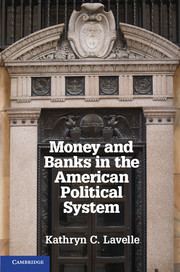Book contents
- Frontmatter
- Contents
- Figures and Tables
- Preface
- Acknowledgments
- Abbreviations
- 1 The Institutional Foundations of Financial Politics in the United States
- Section 1 A Historical Background
- Section 2 Bureaucratic Politics and Finance
- Section 3 The Operation of the Financial Political Economy
- Section 4 Conclusions
- Glossary
- References
- Index
Section 1 - A Historical Background
Published online by Cambridge University Press: 05 January 2013
- Frontmatter
- Contents
- Figures and Tables
- Preface
- Acknowledgments
- Abbreviations
- 1 The Institutional Foundations of Financial Politics in the United States
- Section 1 A Historical Background
- Section 2 Bureaucratic Politics and Finance
- Section 3 The Operation of the Financial Political Economy
- Section 4 Conclusions
- Glossary
- References
- Index
Summary
A Historical Background
The next two chapters consider the historical background within which the bureaucracy surrounding finance emerged that distinguishes the United States from other advanced, industrial democracies. The general unease that exists between the business community and the American state can be explained, at least in part, by the time frame of the development of the two in relation to each other and a political culture that distrusts the concentration of political and economic power. The way that this state capacity – or the national administrative capability – to govern finance was built across American history matters today because it influences the way the system operates with its inherent competition among agencies for authority, budgets, and personnel, as well as the way that different interests have captured different agencies.
David Vogel argues that early in U.S. history, the country’s most talented individuals pursued economic gain and material growth; thus they did not work to develop national political and administrative capacity. As a result, a large number of firms dominated the American economy by 1909 whose successors operate today, such as Standard Oil (now Exxon- Mobil and others in the oil and gas industry), United Fruit (now Chiquita Brands International), and General Electric. It was not until the late 1930s that the annual revenues of the federal government rivaled those of the assets of the largest industrial corporations. This sequence means that many corporations are far older than the government agencies of comparable importance. Moreover, unlike many other countries, the American business community did not have the historical experience of coexisting or competing with other established institutions, like the military, clergy, universities, or aristocracy.
- Type
- Chapter
- Information
- Money and Banks in the American Political System , pp. 31 - 32Publisher: Cambridge University PressPrint publication year: 2013



